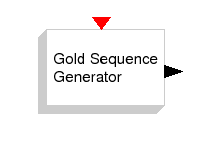Gold sequence generator block
Gold sequence generator is a class of pseudorandom generator which has good randomness properties to decrease the multiple access noise found in multi-user DS-CDMA communication systems.
It is composed with two Maximal Length Liner Shift Register (MLLSR) sequence generator.
Most properties of this registers can be found in [1].
An example of block diagram of Gold sequence generator with 5-length MLLSR is shown in Fig. 1.
Figure 1: Gold sequence generator
Each clock time, the registers shift all elements to the right.
The following general equation gives the output of a Gold generator:
 and
and  are the outputs of the MLLRS,
are the outputs of the MLLRS,  and
and  are the corresponding connection variables and
are the corresponding connection variables and  the length of registers.
All terms are binary, meaning that adders are realized with the boolean exclusive-OR operator.
In fact, each register needs only two integer value to be processed (one value for states and one value for connections).
In that block, all operations -modulo-2 adders, shifts- are realized with the binary operators of C language that ensures fast dynamical computation.
the length of registers.
All terms are binary, meaning that adders are realized with the boolean exclusive-OR operator.
In fact, each register needs only two integer value to be processed (one value for states and one value for connections).
In that block, all operations -modulo-2 adders, shifts- are realized with the binary operators of C language that ensures fast dynamical computation.
- Vector of Size of outputs
Type 'vec' of size -1. The length of sequences.
- Vector of Length of register
Type 'vec' of size -1. The length of register(s).
- Vector of Initial condition register 1
Type 'vec' of size -1. The initial state of register(s) 1 in integer value.
- Vector of Initial condition register 2
Type 'vec' of size -1. The initial state of register(s) 2 in integer value.
- Vector of coefficients register 1
Type 'vec' of size -1. The coefficients of register(s) 1 in integer value.
- Vector of coefficients register 2
Type 'vec' of size -1. The coefficients of register(s) 1 in integer value.
- Initial Delay
Type 'vec' of size 1. The initial delay in sample.
- always active: no
- direct-feedthrough: no
- zero-crossing: no
- mode: no
- regular outputs:
- port 1 : size [31,1] / type 1
- number/sizes of activation inputs: 1
- number/sizes of activation outputs: 0
- continuous-time state: no
- discrete-time state: yes
- object discrete-time state: no
- name of computational function: gengold
- MODNUMCOS/macros/scicos_blocks/Sources/GENGOLD_f.sci [view code]
- MODNUMCOS/routines/sources/gengold.c (Type 4) [view code]
IRCOM Group Alan Layec
- 1
-
A. J. Viterbi, Principles of Spread Spectrum Communication.Addison-Wesley, 1995.



